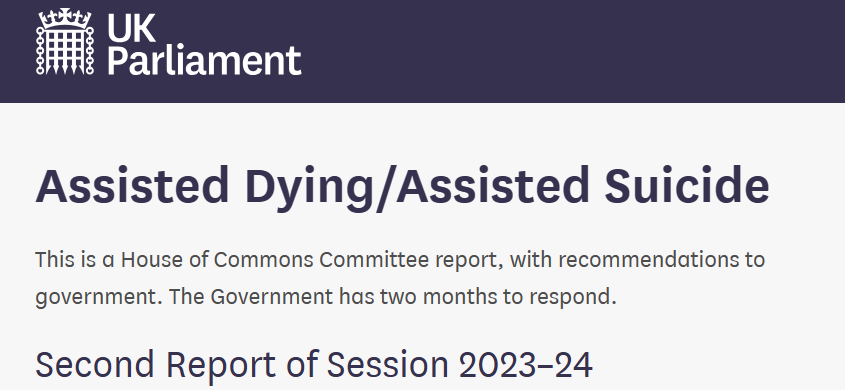بِسۡمِ اللهِ الرَّحۡمٰنِ الرَّحِيۡمِ

Introduction
On 29th Feb. 2024, the Health and Social Care Committee (U.K.) has published a report after a 14-month enquiry on assisted dying/ suicide, also referred to as physician-assisted dying (PAD) or physician-assisted suicide (PAS) or medical-aid in dying (MAiD). The debate surrounding the legalization of physician-assisted dying in the United Kingdom has been a topic of significant contention and ethical consideration. Proponents argue for the recognition of individual  autonomy and dignity in end-of-life decision-making, while opponents raise concerns about the potential risks and complexities associated with legalizing physician-assisted dying.
autonomy and dignity in end-of-life decision-making, while opponents raise concerns about the potential risks and complexities associated with legalizing physician-assisted dying.
On 16 October 2024, Kim Leadbeater (Labour) presented the Terminally Ill Adults (End of Life) Bill 2024-25 to Parliament, having been drawn first in the Private Members’ Bills ballot for the 2024-25 session. The full text of the bill has not yet been published, but its long title states it will “allow adults who are terminally ill, subject to safeguards and protections, to request and be provided with assistance to end their own life”.
The bill’s second reading is scheduled for Friday 29 November 2024. "The Law on Assisted Suicide" pdf file is attached below
Physician-assisted dying involves a medical doctor who organises the suicide of a patient under his/ her care by providing the logistical means to end life such as prescribing the necessary lethal medication.
Proponent's Arguments
1. Personal Autonomy and Dignity
Proponents of legalizing physician-assisted dying emphasize the fundamental importance of individual autonomy and dignity in end-of-life choices. They argue that individuals facing terminal illnesses or severe disabilities should have the option to peacefully depart from life on their own terms. Drawing from experiences in jurisdictions where physician-assisted dying is legalized, proponents highlight the determination and dignity displayed by individuals who choose this option as a means to avoid prolonged suffering and loss of autonomy.
2. International Examples and Referendum in Massachusetts
The availability of physician-assisted dying in various jurisdictions globally serves as a testament to the growing acceptance of end-of-life autonomy. Proponents point to upcoming referendums, such as the one in Massachusetts, as indicators of shifting attitudes towards physician-assisted dying. Personal anecdotes underscore the importance of providing individuals with the option to end their lives in a dignified manner, similar to practices in jurisdictions where physician-assisted dying is permitted.
3. Avoidance of Lingering in Old Age or States of Decline
Reference to the European Court of Human Rights' recognition of the right to avoid lingering in old age or states of decline strengthens proponents' arguments. Legalizing physician-assisted dying is framed as a means to alleviate prolonged suffering and maintain autonomy in the face of debilitating conditions. Advocates assert that allowing individuals to choose the timing and manner of their death upholds principles of compassion and respect for personal autonomy.
Opponents' Arguments
1. Criminal Law and Public Safety
Opponents of legalizing physician-assisted dying argue that the current criminal law serves as a deterrent against unacceptable behaviour, including assisting in suicides. They question the need for legalization, citing the effectiveness of existing laws in deterring assisted suicide. Concerns are raised about the potential for a rise in cases of physician-assisted dying if legalized, based on international examples where legalization has led to an increase in physician-assisted suicides.
2. Risks and Complexities
Critiques of proposed safeguards highlight the potential risks and complexities associated with legalizing physician-assisted dying. Opponents argue that placing too much trust in doctors' assessments may overlook the intricacies of patient decision-making and family dynamics. They stress the vulnerability of individuals considering physician-assisted dying and the potential for errors in assessment, drawing parallels to the abolition of the death penalty and the importance of upholding principles safeguarding against wrongful loss of life.
Additional Arguments and Concerns
Concerns about Future Developments
Opponents express concerns about potential future developments, such as organ donation after physician-assisted dying, and the ethical implications of healthcare professionals becoming involved in physician-assisted dying. The risk of unintended consequences and the erosion of safeguards are highlighted as reasons to proceed with caution in considering legalization.
Possible implications for Muslims
In Islāmic succession law, intentional or unjustifiable killing according to Sharīʿa is a bar to inheritance. The legal maxim for disqualifying a killer from inheriting is that whoever accelerates the process of gaining something before its actual/ proper time is prohibited from gaining it. The application of this law is expressed extensively in the Shāfiʿī fiqh wherein all forms of killing act an an impediment to inheritance. According to the Hanafī fiqh, a killer is excluded from a bequest in a similar manner A killer legatee is excluded from inheriting from his victim unless the heirs of the testator consent to the bequest so that any direct killing of the testator excludes the killer from receiving a bequest.
Conclusion
In conclusion, the debate surrounding the legalization of physician-assisted dying in the U.K. is complex and multifaceted, with valid arguments on both sides. While proponents emphasize the importance of individual autonomy and dignity, opponents raise significant concerns about public safety and the potential risks associated with legalization. Given the gravity of the decision, careful deliberation and thorough examination of evidence are essential before making any decision regarding the legalization of physician-assisted dying. Ultimately, the need to balance individual autonomy with public safety remains paramount, and further discussion and consideration of the implications are warranted before any definitive action is taken.
The onus should be on the proponents of physician-assisted dying to provide sufficient evidence that the current NHS system is inadequate to care for dying patients. A few examples of extreme cases should not be used to change the law.
Legalizing physician-assisted dying raises concerns about the potential impact on vulnerable individuals, particularly those grappling with mental illness. There is apprehension that it could alter societal perceptions regarding the sanctity of human life. Additionally, there is a fear that individuals with disabilities or the elderly may feel pressured to consider assisted suicide, viewing themselves as burdens on their loved ones. However, in Islām life is a test, and suicide is explicitly forbidden, as Allāh (![]() ) says in the Qur'ān, "And do not kill yourselves.". As narrated by Jabir (
) says in the Qur'ān, "And do not kill yourselves.". As narrated by Jabir (![]() ), the Messenger of Allah (
), the Messenger of Allah (![]() ) stated, “No believing man or woman, nor Muslim man or woman, is afflicted with illness but that Allah will curtail some of their sins.” (al-Adab al-Mufrad 508508)
) stated, “No believing man or woman, nor Muslim man or woman, is afflicted with illness but that Allah will curtail some of their sins.” (al-Adab al-Mufrad 508508)
Legalization of physician-assisted dying would lead to an ethical dilemma for Muslim doctors in the U.K. involved in the process of physician-assisted dying due to the sanctity of life in Islām, the Qur'ān says, “And that ye slay not the life which Allah hath made sacred, save in the course of justice,” and “whosoever killeth a human being for other than manslaughter or corruption in the earth, it shall be as if he had killed all mankind.”
Dr. A. Hussain,
UPDATE 29th November 2024
After five hours of intense and heartfelt debate the Assisted Dying Bill passed its initial vote in the House of Commons with 330 votes in favour and 275 against, marking a historic moment in UK legislative history. Although this is disappointing for those of us who oppose the concept of suicide the result is not a surprise.
Kim Leadbeater, the Bill's main sponsor, emphasized that the legislation is about "giving dying people a choice about how to die". She argued that the current law is "failing" terminally ill patients by not providing them autonomy in their final months. The primary supporting arguments were:
- Providing terminally ill adults with the right to choose how they die
- Preventing unnecessary suffering for those with terminal illnesses
- Offering a compassionate alternative to prolonged, painful end-of-life experiences
The Bill is to include multiple protective measures:
- Only available to adults over 18
- Patients must have less than six months to live
- Requires approval from:
- Two independent doctors
- A High Court judge
- Patients must self-administer medication
- Maximum 14-year prison sentence for coercion
73% of the British public supports assisted dying and over 500 British people have already sought assisted dying in Switzerland. With these kinds of statistics, the Bill will likely be incorporated into law.
Dr. A. Hussain, Nov. 2024
| Attachment | Size |
|---|---|
| Assisted Dying Bill SN04857.pdf.pdf | 1.36 MB |
2024
